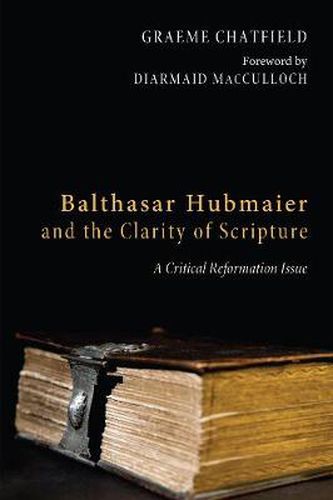Readings Newsletter
Become a Readings Member to make your shopping experience even easier.
Sign in or sign up for free!
You’re not far away from qualifying for FREE standard shipping within Australia
You’ve qualified for FREE standard shipping within Australia
The cart is loading…






This title is printed to order. This book may have been self-published. If so, we cannot guarantee the quality of the content. In the main most books will have gone through the editing process however some may not. We therefore suggest that you be aware of this before ordering this book. If in doubt check either the author or publisher’s details as we are unable to accept any returns unless they are faulty. Please contact us if you have any questions.
During the sixteenth century, many Reformers echoed Erasmus’s claim that the Scriptures were clear, could be understood by even the lowliest servant, and should be translated into the vernacular and placed in the hands of all people. People did not require the magisterium of the Roman Catholic Church to correctly interpret the meaning of the Scriptures. However, within a few short years, the leaders of the Magisterial Reformers, Martin Luther and Huldrych Zwingli, had created their own Protestant versions of the magisterium. This work traces how the doctrine of the clarity of Scripture found expression in the writings of Balthasar Hubmaier, admirer of Erasmus and Luther, and associate of Zwingli. As Hubmaier engaged in theological debate with opponents, onetime friends, and other Anabaptists, he sought to clarify his understanding of this critical reformation doctrine. Chronologically tracing the development of Hubmaier’s hermeneutic as he interacted with Erasmus, Luther, Zwingli, and Hans Denck provides a useful means of more accurately understanding his place in the matrix of the sixteenth-century Reformations.
$9.00 standard shipping within Australia
FREE standard shipping within Australia for orders over $100.00
Express & International shipping calculated at checkout
This title is printed to order. This book may have been self-published. If so, we cannot guarantee the quality of the content. In the main most books will have gone through the editing process however some may not. We therefore suggest that you be aware of this before ordering this book. If in doubt check either the author or publisher’s details as we are unable to accept any returns unless they are faulty. Please contact us if you have any questions.
During the sixteenth century, many Reformers echoed Erasmus’s claim that the Scriptures were clear, could be understood by even the lowliest servant, and should be translated into the vernacular and placed in the hands of all people. People did not require the magisterium of the Roman Catholic Church to correctly interpret the meaning of the Scriptures. However, within a few short years, the leaders of the Magisterial Reformers, Martin Luther and Huldrych Zwingli, had created their own Protestant versions of the magisterium. This work traces how the doctrine of the clarity of Scripture found expression in the writings of Balthasar Hubmaier, admirer of Erasmus and Luther, and associate of Zwingli. As Hubmaier engaged in theological debate with opponents, onetime friends, and other Anabaptists, he sought to clarify his understanding of this critical reformation doctrine. Chronologically tracing the development of Hubmaier’s hermeneutic as he interacted with Erasmus, Luther, Zwingli, and Hans Denck provides a useful means of more accurately understanding his place in the matrix of the sixteenth-century Reformations.